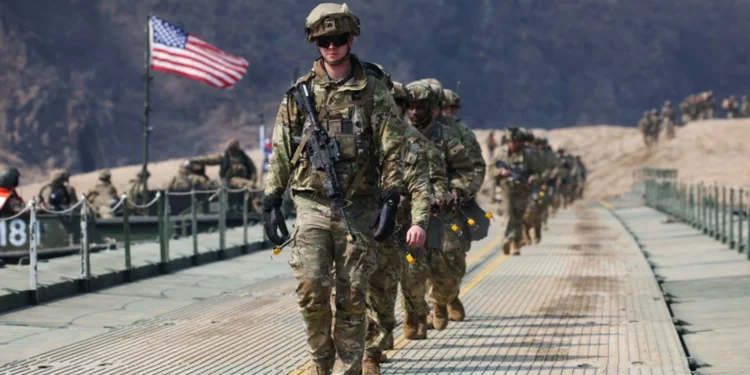Secretary of War Pete Hegseth announced Tuesday the U.S. military killed 14 alleged narco-terrorists in a series of strikes against four suspected drug vessels in the Eastern Pacific.
“These narco-terrorists have killed more Americans than Al-Qaeda, and they will be treated the same. We will track them, we will network them, and then, we will hunt and kill them,” Hegseth wrote on X.
Since September, the U.S. has carried out at least 13 strikes against alleged drug vessels, mostly in the Caribbean, killing dozens.
The strikes are coming amid growing tensions between the U.S. and Venezuela. The U.S. has accused the country’s government of being involved in drug trafficking and its President, Nicolas Maduro, of controlling Tren de Aragua.
“Every one of those boats is responsible for the death of 25,000 American people,” Trump said earlier this month.
Meanwhile, Venezuela views the strikes as a threat to its sovereignty. Maduro also alleges that Trump is seeking regime change through military action.
The country’s vice president, Delcy Rodriguez, claimed this week it captured a mercenary group linked to the CIA, plotting a false flag attack.
“A false flag attack is underway in waters bordering Trinidad and Tobago or from Trinidadian or Venezuelan territory to generate a full military confrontation with our country,” Rodriguez said.
Rodriguez didn’t share any evidence or go into more detail, but President Donald Trump confirmed while speaking from the Oval Office earlier this month that he’s authorized the CIA to carry out covert operations in Venezuela.
“They have emptied their prisons into the United States. We have a lot of drugs coming in from Venezuela and a lot of the Venezuelan drugs come in through the sea, so you get to see that,” Trump said.
Multiple U.S. officials involved in the Latin America operation told news outlets they’ve been asked to sign non-disclosure agreements, a development raising questions about a military buildup in the area.
The 14 deaths from strikes against four suspected drug vessels represents average of 3.5 fatalities per boat, suggesting either small crew sizes typical of fast drug-running boats or survivors who escaped by jumping overboard before missiles struck.
Pete Hegseth’s “Secretary of War” title rather than traditional Secretary of Defense signals Trump administration’s rhetorical shift toward explicitly militaristic language emphasizing offensive operations over defensive posture.
The comparison of “narco-terrorists” to Al-Qaeda elevates drug traffickers to national security threat level justifying military force traditionally reserved for terrorist organizations, expanding war on drugs into literal warfare with lethal strikes.
The “track them, network them, hunt and kill them” language describes counterterrorism methodology applied to drug interdiction, using intelligence gathering to map trafficking organizations before executing targeted killings without arrest or trial.
The 13 strikes since September killing dozens of alleged traffickers represents dramatic escalation from traditional Coast Guard interdictions where vessels are boarded, crews arrested, and contraband seized rather than boats destroyed with all aboard.
The Caribbean concentration of most strikes suggests U.S. forces target trafficking routes between South American production centers and North American markets, with Eastern Pacific strikes addressing vessels using Pacific coastal routes.
The Venezuela accusation that Maduro’s government controls Tren de Aragua gang links state leadership to transnational criminal organization operating across Latin America and increasingly in U.S. cities including Seattle where the gang has established presence.
Trump’s claim that “every one of those boats is responsible for the death of 25,000 American people” attempts mathematical justification for extrajudicial killings, though the attribution methodology connecting individual vessels to specific overdose deaths remains unexplained.
Venezuela’s sovereignty concerns reflect international law prohibitions against military strikes in other nations’ territorial waters without declarations of war or UN Security Council authorization, raising questions about strike locations.
Maduro’s regime change allegations tap into Latin American historical grievances about U.S. interventionism, referencing coups in Chile, Guatemala, and elsewhere where American actions toppled governments deemed hostile to U.S. interests.
Vice President Delcy Rodriguez’s captured mercenary group claim without evidence mirrors standard authoritarian regime tactics deflecting from domestic problems by fabricating external threats and CIA conspiracies.
The false flag attack allegation that operations near Trinidad and Tobago aim to “generate a full military confrontation” suggests Venezuela fears U.S. forces will stage an incident justifying invasion, similar to historical Gulf of Tonkin precedents.
Trump’s Oval Office confirmation of authorized CIA covert operations in Venezuela represents rare public acknowledgment of classified activities, with presidents typically maintaining plausible deniability about intelligence agency operations.
The “emptied their prisons into the United States” claim references Trump’s frequent assertion that Latin American countries deliberately release criminals who then migrate northward, though evidence supporting systematic prisoner release programs remains disputed.
The non-disclosure agreements required of U.S. officials involved in Latin America operations indicate classified military planning beyond routine drug interdiction, potentially including invasion preparations or regime change operations.
The military buildup questions raised by NDA requirements suggest forces positioning beyond Coast Guard cutters and DEA agents to include combat units, special operations forces, or naval assets preparing for potential Venezuela conflict.
Seattle’s distance from Caribbean and Eastern Pacific strike zones obscures the city’s connection to the drug war, though fentanyl and cocaine interdicted at sea would otherwise reach Pacific Northwest markets feeding the region’s opioid crisis.
Washington state’s progressive political culture creates tension with aggressive military drug interdiction where voters who support harm reduction and drug decriminalization confront federal policies emphasizing lethal force against traffickers.
The strikes’ impact on drug availability and prices in Seattle remains unclear, with interdiction advocates claiming supply disruption while critics argue that killing traffickers creates power vacuums filled by more violent successors.
The escalation from arrest to assassination represents policy shift where drug traffickers face summary execution rather than criminal justice proceedings, raising constitutional and human rights concerns that may eventually reach federal courts.







